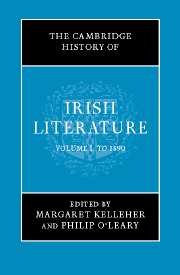Book contents
- Frontmatter
- Introduction
- 1 The literature of medieval Ireland to c. 800: St Patrick to the Vikings
- 2 The literature of medieval Ireland, 800–1200: from the Vikings to the Normans
- 3 The literature of later medieval Ireland, 1200–1600: from the Normans to the Tudors
- 4 Literature in English, 1550–1690: from the Elizabethan settlement to the Battle of the Boyne
- 5 Literature in Irish, c.1550–1690: from the Elizabethan settlement to the Battle of the Boyne
- 6 Prose in English, 1690–1800: from the Williamite wars to the Act of Union
- 7 Poetry in English, 1690–1800: from the Williamite wars to the Act of Union
- 8 Literature in Irish, 1690–1800: from the Williamite wars to the Act of Union
- 9 Theatre in Ireland, 1690–1800: from the Williamite wars to the Act of Union
- 10 Irish Romanticism, 1800–1830
- 11 Prose writing and drama in English, 1830–1890: from Catholic emancipation to the fall of Parnell
- 12 Poetry in English, 1830–1890: from Catholic emancipation to the fall of Parnell
- 13 Literature in Irish, 1800–1890: from the Act of Union to the Gaelic League
- 14 Historical writings, 1690–1890
- 15 Literature and the oral tradition
- Guide to major subject areas
- Index
- References
4 - Literature in English, 1550–1690: from the Elizabethan settlement to the Battle of the Boyne
Published online by Cambridge University Press: 28 March 2008
- Frontmatter
- Introduction
- 1 The literature of medieval Ireland to c. 800: St Patrick to the Vikings
- 2 The literature of medieval Ireland, 800–1200: from the Vikings to the Normans
- 3 The literature of later medieval Ireland, 1200–1600: from the Normans to the Tudors
- 4 Literature in English, 1550–1690: from the Elizabethan settlement to the Battle of the Boyne
- 5 Literature in Irish, c.1550–1690: from the Elizabethan settlement to the Battle of the Boyne
- 6 Prose in English, 1690–1800: from the Williamite wars to the Act of Union
- 7 Poetry in English, 1690–1800: from the Williamite wars to the Act of Union
- 8 Literature in Irish, 1690–1800: from the Williamite wars to the Act of Union
- 9 Theatre in Ireland, 1690–1800: from the Williamite wars to the Act of Union
- 10 Irish Romanticism, 1800–1830
- 11 Prose writing and drama in English, 1830–1890: from Catholic emancipation to the fall of Parnell
- 12 Poetry in English, 1830–1890: from Catholic emancipation to the fall of Parnell
- 13 Literature in Irish, 1800–1890: from the Act of Union to the Gaelic League
- 14 Historical writings, 1690–1890
- 15 Literature and the oral tradition
- Guide to major subject areas
- Index
- References
Summary
Faced with the massed heaps of state papers about Irish affairs awaiting his attention on his accession in 1603, James I reportedly declared that there is ‘more ado about Ireland than all the world beside’. The overriding impression fostered by current historical accounts of sixteenth- and seventeenth-century Ireland is that political, diplomatic and propagandist writing predominates and that literary production is fitful and even at times non-existent. The assumption persists too that Ireland was in the main untouched by the cultural transformations and creative energies of the continental and English Renaissances. This chapter sets out to redress such views by charting the diversity of Anglophone writing in the early modern period and by tracing the complex generic interconnections between texts by Irish authors from various ethnic backgrounds, by English writers who incorporate Irish scenes and characters despite lack of first-hand experience of Irish society, and by English travellers, soldiers, settlers and colonists who spent periods of time in the country. It will further be contended that Irish writing in this era, despite its intimate links with English literary practices, constitutes a discrete tradition whose peculiar characteristics are instigated by local political and social concerns. In short, this overview of Irish literature in English will chart the first emergence of a circumscribed, indigenous Anglophone culture during the sixteenth century and its subsequent growth and further development by the end of the seventeenth century. By 1690 a distinctive but multi-faceted corpus in English had evolved that was shaped by the modalities of local experience and the turbulent cultural and political interactions of the Renaissance age.
- Type
- Chapter
- Information
- The Cambridge History of Irish Literature , pp. 140 - 190Publisher: Cambridge University PressPrint publication year: 2006
References
- 5
- Cited by

